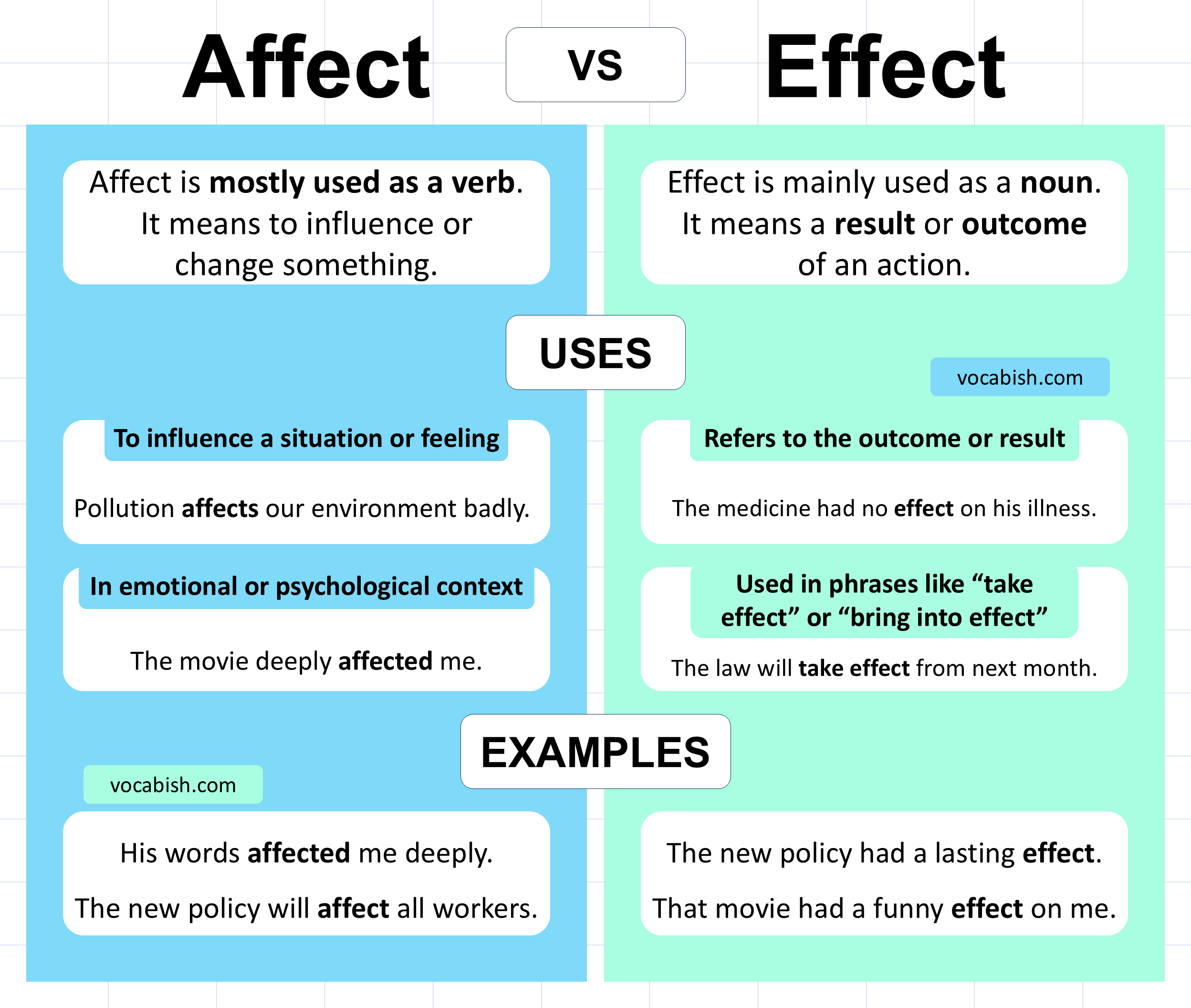In this blog post, you will learn the difference between affect and effect. These two words look similar and are often confused, but they have different meanings and grammar roles in a sentence. Many learners are unsure when to use one as a verb and the other as a noun. When you understand this difference, you can avoid common mistakes and improve your accuracy in writing and speaking. Knowing how to use these words correctly will also help you read and listen with better understanding. Keep reading to master their correct uses with helpful examples.
Meanings of Affect and Effect
Affect
Affect is mostly used as a verb. It means to influence or change something.
Example:
- The weather can affect your mood.
- Lack of sleep affects your concentration.
Effect
Effect is mainly used as a noun. It means a result or outcome of an action.
Example:
- The new law had a positive effect on the economy.
- Smoking has harmful effects on health.
Differences Between Affect and Effect
| Word | Part of Speech | Meaning | Example |
|---|---|---|---|
| Affect | Verb | To influence or change something | The rain affected the game. |
| Effect | Noun | The result or outcome of something | The effect of the rain was a wet field. |
Quick Tip:
- Affect = Action (Verb)
- Effect = End Result (Noun)
Usage of Affect
1. To influence a situation or feeling
- Her attitude affects everyone in the team.
- Pollution affects our environment badly.
2. In emotional or psychological context
- The movie deeply affected me.
- Stress can affect your mental health.
Usage of Effect
1. Refers to the outcome or result
- The new teacher had a great effect on the students.
- The medicine had no effect on his illness.
2. Used in phrases like “take effect” or “bring into effect”
- The law will take effect from next month.
- The new rules were brought into effect immediately.
Formal and Informal Uses of Affect and Effect
| Type | Affect | Effect |
|---|---|---|
| Formal | “The company’s decision affected its employees.” | “The new policy had a lasting effect.” |
| Informal | “The weather affects my mood.” | “That movie had a funny effect on me.” |
Sentences with Affect
- The cold weather can affect your health.
- His words affected me deeply.
- The new policy will affect all workers.
- Pollution affects the environment badly.
- Stress can affect your sleep quality.
- The heavy rain affected the road conditions.
- Your attitude affects how others see you.
- The lack of sunlight affects plant growth.
- Poor diet affects your body over time.
- The teacher’s mood affects the class energy.
- Global warming affects the weather patterns.
- His illness affected his performance.
- The decision affected thousands of people.
- The delay affected the project timeline.
- Her kindness affected everyone in the room.
- The power cut affected all nearby houses.
- The economic crisis affected small businesses.
- Bad habits can affect your success.
- The noise affects my concentration.
- The movie affected the audience emotionally.
Sentences with Effect
- The medicine had a strong effect on his body.
- The new law had a positive effect on workers.
- The weather has a direct effect on farming.
- The speech had a great effect on the crowd.
- Exercise has many good effects on health.
- The noise had no effect on the baby.
- The new policy came into effect yesterday.
- His smile had a calming effect on me.
- The movie’s ending had an emotional effect.
- The teacher’s advice had a lasting effect.
- Smoking has bad effects on the lungs.
- The announcement had a surprising effect.
- The rules will take effect next month.
- Lack of sleep has a serious effect on the brain.
- The lighting created a beautiful effect.
- The economic effects of inflation are worrying.
- His words had a strong effect on her decision.
- Music has a relaxing effect on the mind.
- The medicine took effect after ten minutes.
- The new changes had an immediate effect on performance.
Summary on Effect vs Affect
- Affect → Verb → means to influence
- Effect → Noun → means the result
Think like this:
- Your words can affect someone’s feelings.
- Your words can have a strong effect on someone.
FAQs on Affect vs Effect
What is the main difference between affect and effect?
Affect is usually a verb meaning to influence, while effect is a noun meaning the result.
Can “effect” be used as a verb?
Yes, but rarely. As a verb, effect means to bring about or to cause something to happen.
Example: The new manager will effect many changes.
Is “affect” ever a noun?
Yes, in psychology, affect as a noun means emotion or feeling.
Example: The patient displayed a happy affect.
How can I remember the difference easily?
Think Affect = Action (Verb) and Effect = End Result (Noun).
Which word should I use in “cause and ___”?
Use effect — for example: Cause and effect are connected.
Read More

